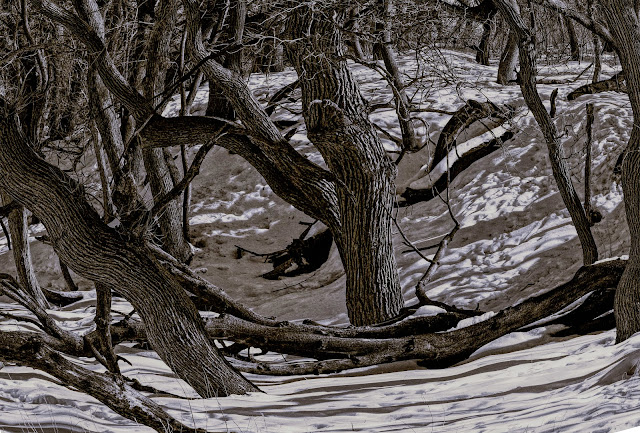Nevertheless, while the attack on Judge Bradley was undoubtedly inspired by outside agitators, of whom "Mother Bloor" was one of the more distinguished Communists, all of those who were caught and tried in the subsequent military occupation were residents of Plymouth county or nearby territory. Many of them were bona fide farmers.
It was hard the morning after, I'm sure, hard on those dozens who'd grabbed him from his court, the dozens who threatened to hang him, the dozens who put him in the back of a truck and took off out of town. Truth be told, they'd treated him as if he were himself the cause of all their economic problems; they'd put a hub cap on his head like a helmet,pulled down his pants, then tied a rope around his neck, let him know they were about to hang the guy.
But Judge Charles C. Bradley, kneeling in the dirt at the side of a country road, wouldn't budge, wouldn't do what they wanted him to do--to swear not to carry out one more blasted farm foreclosure, like the one in Primgahr they'd just witnessed. Too many good men, too many fine farm families were being tossed off their land when it became impossible for them to keep up with payments because--as the whole world needed to know--a man couldn't make a living on corn that wasn't worth a dime, milk that a good farmer might just as well dump as bring to market. How is a man supposed to pay what he owes when there's no money anywhere?
The judge is in his court room in LeMars, they told each other, just the kind of enemy they needed. That's how it was that they were there that afternoon, April 27, 1933. They were juiced with their own righteous anger. Farmers couldn't prosper when they barely could live. So they went to Le Mars to find the damned judge.
They did everything but hang him, their anger somehow melted by time slipping by, by a brace of good sense, by the judge who, when given the chance, prayed for justice for all people. They didn't string him up, as they'd promised.
The anger didn't subside. It would take some time--years!--for handsome prices to return. But the next day there had to be some shame. Hence, as the obituary says, it was easy to blame those damned outside agitators, the commies who were infiltrating everything, bringing about no good by lighting fires that could burn down the whole county. It was "outside agitators" that turned good farmers into thugs, church men into killers. It was those outside agitators that brought grief to the county.
So it turns out that when the toll was taken and the marauders identified, they were all locals. Wasn't a commie among them. Not only that, there was regret, embarrassment, shame, along with some prison sentences.
It's just so much easier to count on others when it comes to shame and regret. Life is so much easier with "outside agitators." It's just so much easier to put the blame on nameless others.
In 1933, right here in northwest Iowa, not all that far down the road, a gang of frenzied farmers grabbed a judge right out of his courtroom, drove him out into the country, hung a rope around his neck, slipped that rope over a telephone pole, then, blessedly couldn't do it. Amazing.
Lord knows their anger had cause. Lord knows good people lost their way of life problems far out of control, problems with no solutions they could make whole.
It would take a decade and another world war for problems on the farm to disappear.
But the grand idea of blaming "outside agitators" wouldn't disappear and likely never will.
It's just too much like us.



















